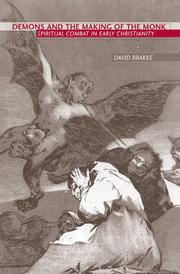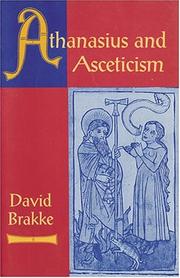| Listing 1 - 10 of 29 | << page >> |
Sort by
|
Book
ISBN: 9780674046849 0674046846 9780674066038 0674058895 0674066030 0674262336 Year: 2010 Publisher: Cambridge: Harvard university press,
Abstract | Keywords | Export | Availability | Bookmark
 Loading...
Loading...Choose an application
- Reference Manager
- EndNote
- RefWorks (Direct export to RefWorks)
Who were the Gnostics? And how did the Gnostic movement influence the development of Christianity in antiquity? Is it true that the Church rejected Gnosticism? This book offers an illuminating discussion of recent scholarly debates over the concept of 'Gnosticism' and the nature of early Christian diversity. Acknowledging that the category 'Gnosticism' is flawed and must be reformed, David Brakke argues for a more careful approach to gathering evidence for the ancient Christian movement known as the Gnostic school of thought. He shows how Gnostic myth and ritual addressed basic human concerns about alienation and meaning, offered a message of salvation in Jesus, and provided a way for people to regain knowledge of God, the ultimate source of their being. Rather than depicting the Gnostics as heretics or as the losers in the fight to define Christianity, Brakke argues that the Gnostics participated in an ongoing reinvention of Christianity, in which other Christians not only rejected their ideas but also adapted and transformed them. This book will challenge scholars to think in news ways, but it also provides an accessible introduction to the Gnostics and their fellow early Christians.
Gnosticism. --- Church history --- Gnosticisme --- Eglise --- Histoire --- -273.1*11 --- Christianity --- Ecclesiastical history --- History, Church --- History, Ecclesiastical --- History --- Gnosis en christendom --- 273.1*11 Gnosis en christendom --- Gnosticism --- 273.1*11 --- Apostolic Church --- Church, Apostolic --- Early Christianity --- Early church --- Primitive and early church --- Primitive Christianity --- Fathers of the church --- Great Apostasy (Mormon doctrine) --- Gnosticisme. --- Église --- Doctrines --- Église --- Cults --- Church history - Primitive and early church, ca. 30-600. --- Gnosis --- mythology --- ritual --- early Christianity

ISBN: 0674018753 0674028651 9780674028654 9780674018754 Year: 2006 Publisher: Cambridge, Mass. Harvard University Press
Abstract | Keywords | Export | Availability | Bookmark
 Loading...
Loading...Choose an application
- Reference Manager
- EndNote
- RefWorks (Direct export to RefWorks)
In this finely written study of demonology and Christian spirituality in fourth- and fifth-century Egypt, David Brakke examines how the conception of the monk as a holy and virtuous being was shaped by the combative encounter with demons. Drawing on biographies of exceptional monks, collections of monastic sayings and stories, letters from ascetic teachers to their disciples, sermons, and community rules, Brakke crafts a compelling picture of the embattled religious celibate.
Monastic and religious life --- Demonology --- Spiritual warfare --- History --- History of doctrines --- 271 "00/04" --- 235.2 --- Spiritual battle --- Warfare, Spiritual --- Spiritual life --- Demonology, Christian --- Demons --- Evil spirits --- Spirits --- Monastic life --- Spirituality (in religious orders, congregations, etc.) --- Monasticism and religious orders --- Vows --- Kloosterwezen. Religieuze orden en congregaties. Monachisme--?"00/04" --- Kwade engelen. Demonen. Demonologie. Duivel. Satan. Lucifer. Asmodeus. Beëlzebub. Mephistoteles --- Christianity --- 235.2 Kwade engelen. Demonen. Demonologie. Duivel. Satan. Lucifer. Asmodeus. Beëlzebub. Mephistoteles --- Monastic and religious life - Egypt - History - Early church, ca. 30-600. --- Demonology - Egypt - History of doctrines - Early church, ca. 30-600. --- Spiritual warfare - Egypt - History - To 1500.
Book
ISBN: 0198268165 Year: 1995 Publisher: Oxford Clarendon
Abstract | Keywords | Export | Availability | Bookmark
 Loading...
Loading...Choose an application
- Reference Manager
- EndNote
- RefWorks (Direct export to RefWorks)
248 <09> <32> --- 276 =75 ATHANASIUS ALEXANDRINUS --- Asceticism --- -Ascetical theology --- Contempt of the world --- Theology, Ascetical --- Christian life --- Ethics --- Spiritualiteitsgeschiedenis. Geschiedenis van de vroomheid:--algemeen--Oud-Egypte --- Griekse patrologie--ATHANASIUS ALEXANDRINUS --- History --- -Athanasius Saint, Patriarch of Alexandria --- Athanasius, --- -Spiritualiteitsgeschiedenis. Geschiedenis van de vroomheid:--algemeen--Oud-Egypte --- Afanasiĭ, --- Aḟanasīĭ Velikīĭ, --- Atanasio, --- Atanazy, --- Atanazy Wielki, --- Athanase, --- Athanasios, --- Athanāsiyūs, --- Athnāsiyūs, --- Bābā Athanāsiyūs Baṭriyark al-Iskandarīyah, --- أثناسيوس، --- بابا اثناسيوس بطريرك الإسكندرية --- Atanasie cel Mare, --- Pseudo-Athanasius --- Афанасий, --- Atanasije Aleksandrijski, --- Athanasios Alexandreias,
Book
ISBN: 9782251449739 2251449736 Year: 2019 Publisher: Paris: Les Belles Lettres,
Abstract | Keywords | Export | Availability | Bookmark
 Loading...
Loading...Choose an application
- Reference Manager
- EndNote
- RefWorks (Direct export to RefWorks)
La somme de David Brakke introduit le lecteur dans les débats les plus récents à propos du "gnosticisme" et de la diversité du premier christianisme. En reconnaissant que la catégorie "gnostique" est imparfaite et doit être reconsidérée, David Brakke plaide pour un rassemblement plus prudent des preuves sur le premier christianisme, connu comme école de pensée gnostique. Il met ainsi en évidence la manière dont le mythe et les rituels gnostiques se sont adressés à des questionnements humains élémentaires (notamment à propos de l'aliénation et du sens), répandant le message d'un Christ sauveur et permettant aux hommes de regagner leur connaissance de Dieu en tant que source ultime de l'être.Plutôt que de dépeindre les gnostiques comme des hérétiques ou comme les grands perdants de la lutte pour la définition du Christianisme, David Brakke soutient la thèse d'une participation active des gnostiques à la réinvention de la religion monothéiste. Si les autres chrétiens ont pu rejeter les idées gnostiques, ils les ont aussi et surtout adaptées et transformées.
Gnosticisme --- Christianisme --- Relations --- Christianisme. --- Gnosticisme. --- Church history --- Gnosticism --- 273.1 --- 273.1*11 --- 273.1 Gnosis. Gnosticisme --- Gnosis. Gnosticisme --- 273.1*11 Gnosis en christendom --- Gnosis en christendom --- Church history - Primitive and early church, ca. 30-600 --- Theology --- Christianity and other religions --- Église --- Théologie --- History --- Christianity --- Histoire
Book
ISBN: 0674058895 9780674058897 9780674046849 0674046846 0674262336 Year: 2010 Publisher: Cambridge, Mass. Harvard University Press
Abstract | Keywords | Export | Availability | Bookmark
 Loading...
Loading...Choose an application
- Reference Manager
- EndNote
- RefWorks (Direct export to RefWorks)
Brakke writes a pioneering study of the way the demon role relates to religious thinking and to cultural anxieties. The author’s sources include biographies of exceptional monks, collections of monastic sayings and stories, letters from ascetic teachers to their disciples, sermons, community rules, and biblical commentaries. When monks imagined the resistance that they had to overcome in cultivating their selves or the temptation that offered an easier path, they saw supernatural beings that could take the shapes of animals, women, boys, and false angels in their attempts to seduce monks away from their devotion to God. And when they considered the inclinations in their own selves that opposed their best intentions, they concluded that demons introduced such problematic “thoughts” to their minds. Although the last twenty years has seen an explosion of scholarship on early Christian asceticism, producing brilliant explorations of the body, sexual renunciation, fasting, and gender, combat with demons has been left relatively unexplored.
Gnosticism. --- Church history --- Apostolic Church --- Christianity --- Church, Apostolic --- Early Christianity --- Early church --- Primitive and early church --- Primitive Christianity --- Fathers of the church --- Great Apostasy (Mormon doctrine) --- Cults
Book
ISBN: 9780300173260 0300173261 Year: 2022 Publisher: New Haven: Yale university press,
Abstract | Keywords | Export | Availability | Bookmark
 Loading...
Loading...Choose an application
- Reference Manager
- EndNote
- RefWorks (Direct export to RefWorks)
Since its publication in 2006, The Gospel of Judas has generated remarkable interest and debate among scholars and general readers alike. In this noncanonical Coptic text from the second century CE, Jesus engages in a series of conversations with his disciples and with Judas, explaining the origin of the cosmos and its rulers, the existence of another holy race, and the coming end of the current world order. In this new translation and commentary, David Brakke addresses the major interpretive questions that have emerged since the text's discovery, exploring the ways that The Gospel of Judas sheds light on the origins and development of gnostic mythology, debates over the Eucharist and communal authority, and Christian appropriation of Jewish apocalyptic eschatology. The translation reflects new analyses of the work's genre and structure, and the commentary and notes provide thorough discussions of the text's grammar and numerous lacunae and ambiguities.
Apocryphal books (New Testament) --- 229 --- 229 Apocriefen. Pseudepigrafen. Deutero-canonieke boeken --- 229 Livres apocryphes. Pseudepigraphes. Livres deuterocanoniques --- Apocriefen. Pseudepigrafen. Deutero-canonieke boeken --- Livres apocryphes. Pseudepigraphes. Livres deuterocanoniques --- New Testament apocryphal books --- Gospel of Judas --- Bible. --- Gospel of Judas Iscariot --- Peuaggelion Nioudas --- Secret book of Judas of Kerioth --- Secret Gospel of Judas of Kerioth
Book
Year: 1994 Publisher: Roma Pontificium institutum biblicum
Abstract | Keywords | Export | Availability | Bookmark
 Loading...
Loading...Choose an application
- Reference Manager
- EndNote
- RefWorks (Direct export to RefWorks)

ISBN: 9780801860553 0801860555 Year: 1998 Publisher: Baltimore Johns Hopkins University Press
Abstract | Keywords | Export | Availability | Bookmark
 Loading...
Loading...Choose an application
- Reference Manager
- EndNote
- RefWorks (Direct export to RefWorks)
It is often assumed that early Christian asceticism drew its followers completely away from worldly concerns into the realm of pure spirituality. But the life and thought of Athanasius, Bishop of Alexandria (AD 328-73), shows just how worldly—and deeply political—ascetic theology could be. David Brakke examines this important church leader's efforts to reconcile asceticism's compelling intensity with the more conventional needs of the families and everyday believers on whom the Church relied for support and stability. Brakke describes how Athanasius joined with other fourth century bishops to create a strongly unified Christian church in Egypt, bringing both the solitary monks of the desert and the female ascetics in the cities under church authority by organizing them into auxiliaries of the emerging local parishes. By carefully integrating ascetic values and practices into a comprehensive vision of the church as a heavenly commonwealth, Brakke argues, Athanasius unified a community of Christians practicing diverse versions of their faith and helped to establish the lines of administrative and pastoral authority that would be essential to the church's future success. This illuminating study of the turmoil of fourth century Christianity also includes the first English translations of many of Athanasius's ascetic and pastoral writings.
Asceticism --- History --- Athanasius,
Digital
ISBN: 9780674028654 Year: 2009 Publisher: Cambridge, Mass. Harvard University Press
Abstract | Keywords | Export | Availability | Bookmark
 Loading...
Loading...Choose an application
- Reference Manager
- EndNote
- RefWorks (Direct export to RefWorks)
Digital
ISBN: 9780674058897 Year: 2012 Publisher: Cambridge, Mass. Harvard University Press
Abstract | Keywords | Export | Availability | Bookmark
 Loading...
Loading...Choose an application
- Reference Manager
- EndNote
- RefWorks (Direct export to RefWorks)
| Listing 1 - 10 of 29 | << page >> |
Sort by
|

 Search
Search Feedback
Feedback About UniCat
About UniCat  Help
Help News
News